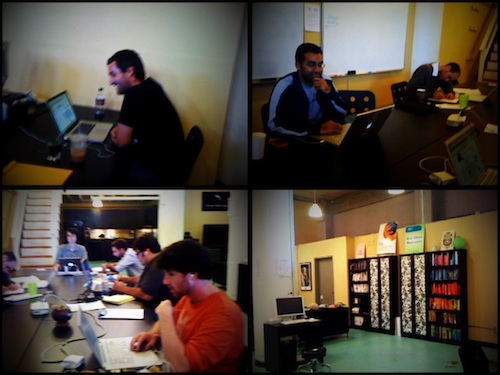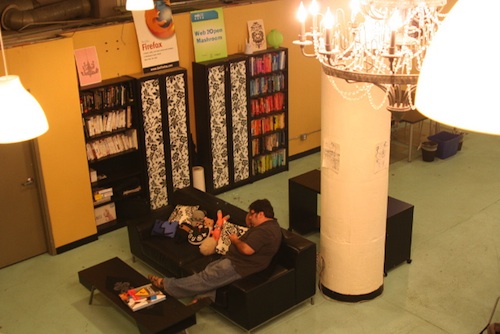In coworking, freelancers and contractors share work space – and sometimes professional or philosophical affinities. On Tuesday morning, about twenty coworking managers, owners, and enthusiasts met for breakfast at Citizen Space to attend "The Current State of Coworking" – a discussion organized by Chris Heuer as part of Social Media Week, SF. People from Citizen Space, Parisoma, NextSpace, Hub BayArea, and others were present, and we Skyped with folks at La Cantine, a coworking space in Paris.
Much of the discussion covered organizational aspects of coworking. Some key points:
- Healthy coworking spaces help retain local talent; cities can play a role. La Cantine is partially sponsored by the city of Paris. The city of Santa Cruz, California, helped create NextSpace in order to retain local talent. As one person put it, “People heading over the mountain to Silicon Valley to work are too tired in the evening to participate in their own city culture.” Hillary Hartley, co-owner of Citizen Space and active in Gov 2.0 initiatives, mentioned San Francisco’s city hall is intrigued by coworking, and has even considered "municipal coworking" as a way of fostering and maintaining talent in the Bay Area.
- Keeping things local creates (unique) coworking spaces. With the growing popularity and press coverage of coworking, some "rent-an-office" businesses have re-branded themselves with coworking to attract business. Authentic coworking, however, thrives when the community self-organizes into a space or when community voices are woven into the culture of a space. "Members have a voice," said Raines Cohen of Hub Bay Area. Just in San Francisco alone, these voices manifest themselves as Citizen Space, Parisoma, Sandbox Suites, Hat Factory, and Cubes & Crayons (not to mention spaces elsewhere in the Bay Area and start-up incubators, some of them pursuing ideas associated with coworking)
- What role does corporate sponsorship play in coworking spaces? We briefly touched on this. Coworking spaces have a wide diversity of models to remain financially sustainable. Citizen Space is member and owner supported, but has been looking into sponsorship opportunities. We are doing so with both the integrity of the space and the needs of the members in mind. Other space have direct corporate sponsorship and are fine.
- Organized community is vital. Sharing experiences with other people was sweeter than the donut I had for breakfast that morning. Online forums and other digital venues are needed, but don’t underestimate the speed of light insight that springs from real-time, face-to-face discussions. A community of coworking owners/managers/coordinators staves off isolation, and is a huge resource for knowledge- sharing and motivation. The informal coworking meetings that take place at the SXSW gathering are important in this regard, too. With that in mind, Chris Heuer offered space at the Social Media "clubhouse" during SXSW for coworkers to meet. Chris also suggested starting a monthly coworking video chat, using something like TokBox. Who’s interested? An organized community also brings buying power for more affordable office equipment, IT services, etc.
- "Coopitition" works. Especially in cities or regions with multiple coworking spaces, embracing the community aspect of this movement is a good thing. As manager of Citizen Space, I recently reached out to other spaces in the city with this in mind and it is has been extremely valuable. It feels great! Sharing expertise and cooperation with competing spaces provides benefits to the whole community.

Some online resources for coworking include:
- Coworking Google Group: Major go-to for how to start a space in your city or town and to brainstorm all things coworking. (At the time of this article, organizing an annual meeting and detailing the pros/cons of open spaces were just two of the active threads in this group.)
- Coworking Wiki: Also useful; there you’ll find the Coworking Visa, which details the reciprocal agreements between coworking spaces around the world. A boon for traveling coworkers!
- Nathan Richez from La Cantine reminded us about Hallenprojekt. It aims to not only list coworking spaces, but to create an online space for coworkers to connect.
The breakfast was great. But these kinds of conversations are happening all over the world, as “networks of independents” create physical spaces and spread the coworking philosophy of collaboration, openness, accessibility, serendipity, and community.









